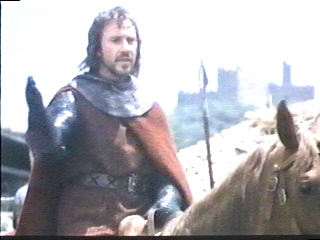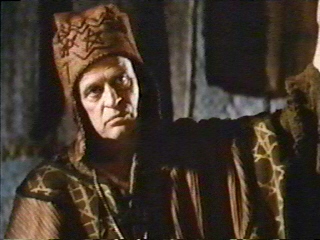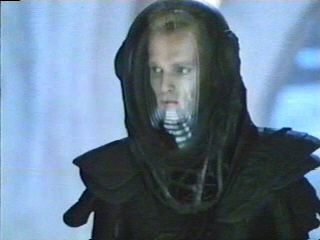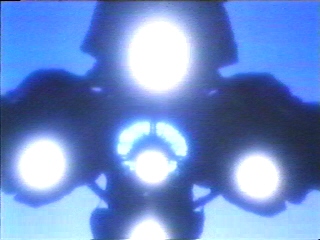
|
|
|
|
|
|
|
|
|
|
|
|
|
(a.k.a. The Knight Of The Dragon) (1985) Director: Fernando
Colomo
It wasn't that long into my viewing of Star Knight when I wondered to myself, "Were the people behind The High Crusade inspired by this movie?" Not long afterwards, I asked myself another question: "If they were, then what kind of deranged minds could ever inspired by Star Knight?" And that immediately lead me to next ask myself, "What kind of deranged minds could have formed Star Knight in the first place?" Though I could not come up with plausible answers to those burning questions brought up by the movie, the movie did remind me of the answers to a question that I have wondered every so often. That is: Why don't European filmmakers make that many science fiction films? Well, the cost to make a movie of this genre is obviously a big factor. To create new and often fantastic environments or props out of nothing can be expensive, and European filmmakers simply don't have the lavish budgets their Hollywood counterparts have. But I think it also has to do with the fact that to successfully tackle science fiction, you need the right attitude. Whenever I have watched a science fiction movie from Europe, I have noticed (not always, but most of the time) that they have been handled by people who seem determined never to handle the subject matter with complete seriousness. Though the sober protagonists may be in a deadly serious struggle, it's not unusual if they are fighting a villain who comes across as goofy due to his style of clothing and/or mannerisms. You see props constructed to look so goofy that, even when you acknowledge the low budget, you say to yourself, "I could have done better with the same amount of money" - and you'd probably be right. So it's perhaps not surprising that European filmmakers
would come up with a movie like Star Knight, an
embarrassment for not only the science fiction genre, but for everyone
involved with its making, cast and Does this all play out nicely together? Oh, come on now - does that question even have to be asked? Well, before the inevitable listing of everything that goes wrong in Star Knight, first comes a synopsis of the characters and the events that bring them all together. The setting is centuries ago in Europe, in some provincial territory named Rook, run by some Count fellow whose actual name I don't think ever gets mentioned. Not like he deserves one, for this particular Count is so ineffective at ruling that it's a wonder that he's still in power. For one thing, he doesn't tell the castle's corrupt Friar Lupo (Rey) to shut up when he keeps practically accusing him of being associated with witchcraft in front of several witnesses at a time. Not only that, this same Count has left the care and trust of his vassals to be supervised by Klever, a greedy soldier who wants nothing but glory and to be knighted by the Count (wait a minute - I though only kings and queens could knight people.) Klever, by the way, is played by Harvey Keitel - yes, the same Harvey Keitel from movies like Bad Lieutenant and Reservoir Dogs plays this chain mail-wearing horse-riding knight wannabe. Not only is Klever willing to sacrifice Rook or the
Count for his own glory and advance, he also has the hots for the
Count's daughter, Princess Alba (Lamor). Were the There are a few more things added on top of all this before everything is properly set up enough so that the main conflicts and plot threads in the movie originate and go forward. But none of this is worth any examination, or even worth any mention. And, as a matter of fact, the same came be said of those main conflicts and plot threads that eventually turn up. I simply didn't care about what happened and what these things resulted in, one big reason being that I didn't care at all for the characters involved in these hijinks, who are so badly written and used that not even the professionals in the cast can do a thing for them. At least, in a positive sense. It is sort of amusing for the first few minutes to see all-American Kietel acting all medieval, and his failed efforts to deliver lines like "Forsooth!" and "Your eyes sparkle like the sun" provide additional merriment. But you can't make an entire unintentionally funny movie on that alone, so after a while Kietel's miscasting becomes tiresome and embarrassing to watch. Though I can't be positively sure Kietel took this role just for the money, I am confident that Kinski signed on for that purpose, since it's been well documented on the many times he took a lesser role for more money over a better part. On one hand, though, Star Knight does give Kinski a chance to play a different role for a change. His physician/scientist character is actually a decent man who freely helps the Count and his daughter throughout. However, Kinski's ghoulish face and creepy smiles are all wrong for this character, and shows that despite Kinski's acting talents, he was best suited for psycho roles. Though almost grotesque miscasting like this puts a
damper on these characters, not even more appropriately cast actors
could give their terribly idiotic characters any kind of positive lift.
Now, I know this movie is taking place hundreds of years ago, a time
where people were nowhere as media-savvy as the average person today.
But even for medieval When the characters are not making us groan with their failed slapstick, Princess Alba and "Ix" the alien (who greatly resembles Sting from Dune - which also came out the previous year) are making us moan with their cheesy interstellar romance. It never apparently occurred to the director that successfully depicting a romance where one of the characters never speaks or shows any visible emotion would be extremely difficult, if not impossible to do. How can you get caught up in someone's romantic pursuit when you don't even know what he's feeling? That's not all; how can you believe two people all of a sudden become (ahem) star-crossed lovers when you don't really get to see how their first meeting went and how they got so attracted to each another? Their scenes end up little better than if Princess Alba was sweet-talking a mannequin. Actually, if there was a mannequin included in Star Knight, it might have made it look like that more money was spent on it than actually there was. Though shot on an actual medieval castle, this central setting for the characters looks surprisingly drab; the exterior is worn and crumbling, and the interior rooms are lacking in furnishings. The surrounding countryside often resembles an open mining pit, and is also plagued by unfocused and washed-out photography. Sometimes a fog machine is used, ostensibly to add some atmosphere, but it doesn't take much figuring out to determine it's to not only mask the drab landscape but to hide the substandard effects of the (little-seen) alien spacecraft flying around. And don't get me started on the interior of the spacecraft. What's really missing from Star Knight,
however, is something that even the
best
Check for availability on Amazon (VHS) See also: Crawlspace, Hearts And Armour, The High Crusade |
 crew. That's partly
because in this case, everyone involved was not just content to make a
somewhat goofy science fiction fantasy - they went all the way to make
it an out and out comedy. Or is it? Well, yes, there are many scenes in
the movie that are obviously played for laughs - comic banter between
two mismatched partners, people falling down and rolling down hills,
someone getting splashed with a bucket of water, slapstick stuff like
that. But when the movie is not making an almost desperate attempt to
make the audience laugh, it then starts going in a completely different
direction with the characters giving a more plausible reaction to the
strange events that got them all involved in this situation. Not just
with their initial reactions, but what they subsequent decide to do,
mostly (and very believably) attempts to exploit for their own personal
benefit what they now know or have. However, the movie isn't just a mix
of slapstick with a study of human nature under atypical circumstances.
Though I am sure it's only a coincidence that Starman happened
to come out the previous year (please re-read that
previous sentence fragment with sarcasm attached to the word
"coincidence), this movie follows its Hollywood predecessor by adding
not just a love story, but an interstellar love story.
crew. That's partly
because in this case, everyone involved was not just content to make a
somewhat goofy science fiction fantasy - they went all the way to make
it an out and out comedy. Or is it? Well, yes, there are many scenes in
the movie that are obviously played for laughs - comic banter between
two mismatched partners, people falling down and rolling down hills,
someone getting splashed with a bucket of water, slapstick stuff like
that. But when the movie is not making an almost desperate attempt to
make the audience laugh, it then starts going in a completely different
direction with the characters giving a more plausible reaction to the
strange events that got them all involved in this situation. Not just
with their initial reactions, but what they subsequent decide to do,
mostly (and very believably) attempts to exploit for their own personal
benefit what they now know or have. However, the movie isn't just a mix
of slapstick with a study of human nature under atypical circumstances.
Though I am sure it's only a coincidence that Starman happened
to come out the previous year (please re-read that
previous sentence fragment with sarcasm attached to the word
"coincidence), this movie follows its Hollywood predecessor by adding
not just a love story, but an interstellar love story.  daughters of Counts
really considered to be princesses? That's a new one for me.
Fortunately for Alba, her father won't even consider such a union, but
he also doesn't seem to think that any other man could be a suitable
suitor, leading the frustrated princess to blurt out that it would take
"a miracle dropping from the sky" to get her father to relax his
judgment. The movie isn't satisfied with one such groan-inducing ironic
statement; around the same time, the Count's kindly physician and
scientist Boecius (Klaus Kinski - yes, Klaus Kinski) draws up a
pentagram on his floor one night in order to call on angels (?) to come
down and give him the secret of the Elixir of Life. Of course, that is
the cue for a great beam of light from an overhead spotlight to all of
a sudden shine down just out of camera range all over the castle, and
subsequently strange things start to happen, like when a goat is
suddenly shoots up high into the sky in the movie's one hilarious scene
(though this particular scene doesn't seem to have been intended to be
funny.) All this quickly has Rook alternately in a panic and
helpfully telling the audience that this currently unseen object they
all got to see was "a dragon".
daughters of Counts
really considered to be princesses? That's a new one for me.
Fortunately for Alba, her father won't even consider such a union, but
he also doesn't seem to think that any other man could be a suitable
suitor, leading the frustrated princess to blurt out that it would take
"a miracle dropping from the sky" to get her father to relax his
judgment. The movie isn't satisfied with one such groan-inducing ironic
statement; around the same time, the Count's kindly physician and
scientist Boecius (Klaus Kinski - yes, Klaus Kinski) draws up a
pentagram on his floor one night in order to call on angels (?) to come
down and give him the secret of the Elixir of Life. Of course, that is
the cue for a great beam of light from an overhead spotlight to all of
a sudden shine down just out of camera range all over the castle, and
subsequently strange things start to happen, like when a goat is
suddenly shoots up high into the sky in the movie's one hilarious scene
(though this particular scene doesn't seem to have been intended to be
funny.) All this quickly has Rook alternately in a panic and
helpfully telling the audience that this currently unseen object they
all got to see was "a dragon".  times these
particular characters are incredibly dim-witted. While I could possibly
believe that their first encounter with the alien spacecraft and its
spacesuit-wearing (humanoid) alien occupant might make them believe
they observed a dragon and his armor-clad knight, the fact that they
stubbornly insist in believing this time and again despite every bit of
evidence to the contrary is not only unbelievable, but frustrating as
well. Why should we be interested by what people think and how they
react if they are a bunch of idiots? Yes, I know this stupid behavior
is supposed to be funny, but it isn't. What usually makes something
funny is some element in it we can recognize and identify with. Had
Klever been of reasonable intelligence, it would unconsciously remind
us of people in our lives with reasonable intelligence that we don't
like, so then seeing him make an ass out of himself might then have
been hilarious and satisfying. Not only are the characters unfunny
idiots, they are unimaginative unfunny idiots. A town crier
looks and talks like Carrot Top, and an armor maker talks in a somewhat
precious way and subtly tries to come onto Klever. Personality quirks
in characters are no longer enough - you now have to take it to a
higher level if you expect the audience to laugh.
times these
particular characters are incredibly dim-witted. While I could possibly
believe that their first encounter with the alien spacecraft and its
spacesuit-wearing (humanoid) alien occupant might make them believe
they observed a dragon and his armor-clad knight, the fact that they
stubbornly insist in believing this time and again despite every bit of
evidence to the contrary is not only unbelievable, but frustrating as
well. Why should we be interested by what people think and how they
react if they are a bunch of idiots? Yes, I know this stupid behavior
is supposed to be funny, but it isn't. What usually makes something
funny is some element in it we can recognize and identify with. Had
Klever been of reasonable intelligence, it would unconsciously remind
us of people in our lives with reasonable intelligence that we don't
like, so then seeing him make an ass out of himself might then have
been hilarious and satisfying. Not only are the characters unfunny
idiots, they are unimaginative unfunny idiots. A town crier
looks and talks like Carrot Top, and an armor maker talks in a somewhat
precious way and subtly tries to come onto Klever. Personality quirks
in characters are no longer enough - you now have to take it to a
higher level if you expect the audience to laugh. special effects can't deliver on
their own - a sense of wonder, of awe of encountering something so
different and mysterious. Instead, except for one scene, "Ix" is
regarded almost as if he's a newly-arrived foreigner who can't speak
English. The one exception is the sequence when Boecius encounters Ix
for the first time. Boecius is so overcome by what he sees that he can
hardly speak. The whole sequence is filmed in almost completely
silence, without giving us a hint as to what is going to happen, and it
has that feeling of mystery and wonder that the rest of the movie is
sorely missing. Actually, if you happen to know a certain part of its
history, there's something else about this movie that can take you
aback and fill you with wonder - and that is that it somehow managed to
wangle an American theatrical release.
special effects can't deliver on
their own - a sense of wonder, of awe of encountering something so
different and mysterious. Instead, except for one scene, "Ix" is
regarded almost as if he's a newly-arrived foreigner who can't speak
English. The one exception is the sequence when Boecius encounters Ix
for the first time. Boecius is so overcome by what he sees that he can
hardly speak. The whole sequence is filmed in almost completely
silence, without giving us a hint as to what is going to happen, and it
has that feeling of mystery and wonder that the rest of the movie is
sorely missing. Actually, if you happen to know a certain part of its
history, there's something else about this movie that can take you
aback and fill you with wonder - and that is that it somehow managed to
wangle an American theatrical release.